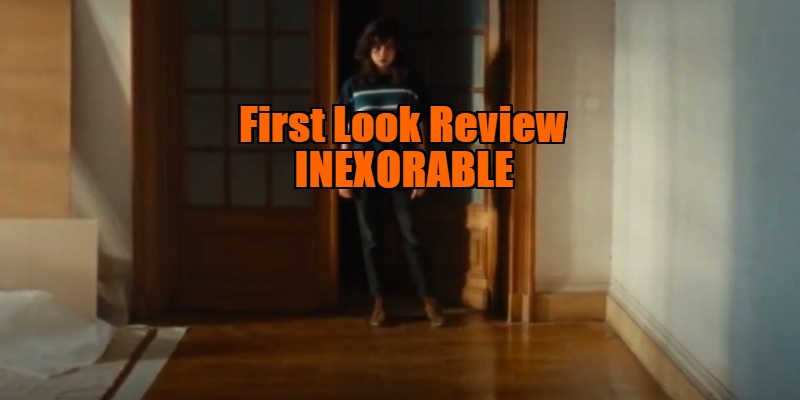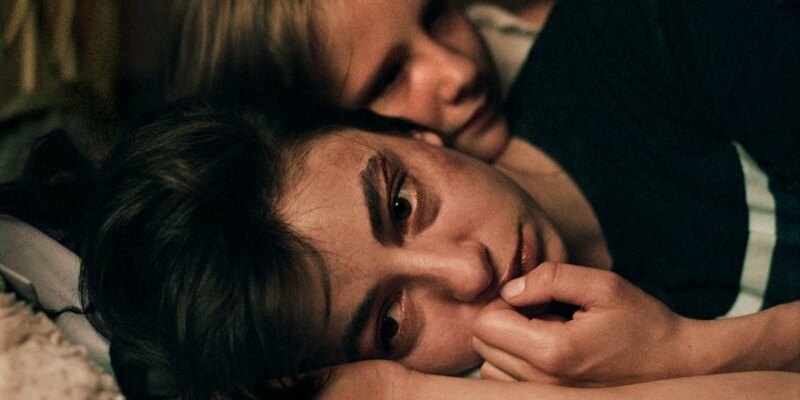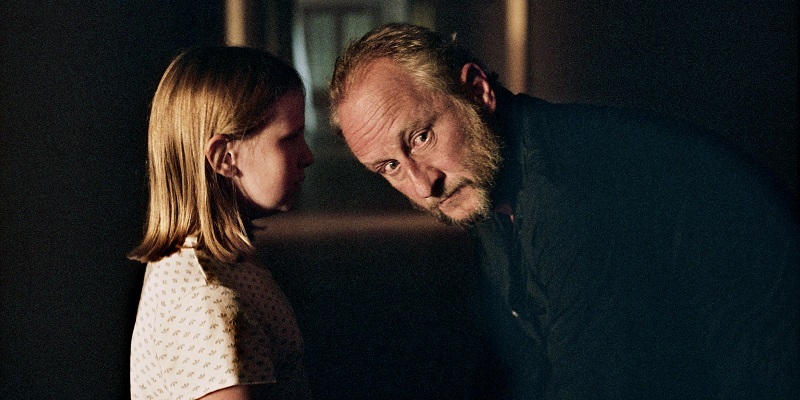
Review by
Eric Hillis
Directed by: Fabrice Du Welz
Starring: Benoit Poelvoorde, Alba Gaia Bellugi, Melanie Doutey, Janaina Halloy Fokan
Household pets rarely make it to the end of psychological thrillers,
especially if there's a vindictive femme fatale about. Who can forget that
poor bunny boiled alive by Glenn Close in Fatal Attraction or Elizabeth Ashley deep-freezing Talia Shire's cat in Gordon Willis's controversial lesbian psycho-thriller Windows, or Mark Wahlberg decapitating Reese Witherspoon's pet pooch in
Fear? (Okay, you've probably forgotten the latter, but it's the only part of
that movie that's stuck with me all these years).
Belgian filmmaker Fabrice du Welz has made a career out of playing
with the tropes of the psychological thriller. His latest,
Inexorable (doesn't that sound like a James Wan title?), opens
with a family taking a trip to a dog kennel to adopt an animal that we
immediately assume isn't going to make it to the closing credits. From the
off, Du Welz is acknowledging the tropes of the modern thriller, and
for the next hour and 40 minutes he has fun subverting a few clichés while
revelling in others.

The dog in question, a big fluffy good boy christened Ulysses by his new
owners, plays a more pivotal role in this film than is usually the case for
expendable four-legged supporting players in movies of this ilk. Ulysses
provides the entry point for the film's "crazy bitch", Gloria (Alba Gaia Bellugi), who retrieves him from the road and takes him back to his owners:
successful novelist Marcel (Benoit Poelvoorde), his
wife/editor Jeanne (Melanie Doutey) and their young
daughter Lucie (Janaina Halloy Fokan).
Impressed by Gloria's instinctive command of the unruly Ulysses, Jeanne
asks the attractive young woman if she could train the animal for a fee.
Gloria accepts and becomes a buddy to the otherwise friendless Lucie in the
process. Jeanne invites Gloria to live in the mansion she and Marcel
inherited from her father and become a nanny to Lucie, an offer Jeanne
accepts. Jeanne has clearly never seen a thriller, or is clueless to the
workings of the male libido, as soon after inviting this hot young woman
into her home she only goes and takes off for a few days.

While Jeanne is away, Gloria and Marcel begin to bond. Turns out she's a
huge fan of his writing, which she seems to know off by heart. Uh (and I
can't stress this enough) oh! Soon, poor old Marcel is being offered free
candy, and to his credit he fights his impulses as long as he can. But
ultimately it turns out Marcel is as much of an animal as Ulysses when it
comes to following his base instincts, and he's sneaking down to the
mansion's lower quarters for some awkward encounters with Gloria.
Of course, these things always come with a price, and Gloria isn't about to
settle for being Marcel's bit on the side. Gloria knows more than she's been
letting on about Marcel, and soon blackmail enters the picture. The more we
learn of Marcel, the more the movie shifts into positing Gloria as something
of an anti-hero.
With his 2004 debut Calvaire, Du Wlez found himself lumped in with his Gallic neighbours in the New
French Extremity movement. That short-lived wave saw a group of French
language filmmakers working in the horror and thriller genres and ramping up
the baser elements of both schools with an added emphasis on violence, often
of a sexual nature. With Inexorable, Du Welz brings this aesthetic to what is otherwise a standard "psycho
bitch" thriller. With its retro-tinged 16mm photography and country mansion
setting, the movie initially resembles some lost Claude Chabrol thriller,
but when Gloria starts mutilating herself we know we're in the hands of a
filmmaker who came of age alongside Gaspar Noe, Pascal Laugier and the duo
of Alexandre Bustillo and Julien Maury. A familiarity with this school
of grisly filmmaking arguably makes Inexorable a tenser
experience, as we understand we're in the hands of a filmmaker prepared to
go a little further than most.

Separated from such extra-textual background, Inexorable is
never quite as tense as it should be however. What's most interesting about
the film is its self-awareness of the genre sandbox it's playing in. I don't
want to get into spoilers but Du Welz brilliantly employs Ulysses in a way
that plays with our expectations regarding psycho-thrillers. Rather than an
expendable mutt reduced to a device to show us just what a meanie the
villain is, the dog becomes a pawn in the psychological games played between
Gloria and Marcel. We fear for the mutt, but we're never certain by whose
hands it's going to meet its likely fate.
Du Welz also adds a few moments of weirdness to keep us on our toes. One of
the film's highlights is an interpretive dance performed by an angry Lucie
to a Death Metal track. But for all its genre interrogation and visual
style, it's the central performances of Poelvoorde and rising star Bellugi
that keep us invested. With his Belgian beer belly and weather-beaten
fissog, Poelvoorde seems an unlikely object of lust for the attractive young
Bellugi, but the film leans into both Marcel's lack of appeal beyond his
words and conversely Gloria's blankness. Marcel is nothing without his
writing, while Gloria barely exists beyond her looks. When Du Welz begins to
rob both his leads of their main assets, his film sucks us in to a storyline
that somehow feels both well-trodden and uniquely original.


